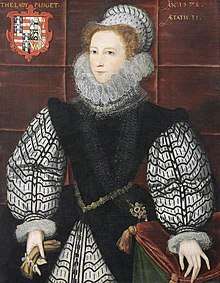Nazareth Newton
Nazareth or Nazaret Newton (d. 1583) was a courtier and lady-in-waiting.

Nazareth Newton was the youngest daughter of Sir John Newton (d. 1568) of East Harptree, Somerset, and Barrs Court, Gloucestershire, and Margaret, daughter of Sir Anthony Poyntz of Iron Acton and Elizabeth Huddesfield.
At Harptree the Newton family lived at Eastwood, a house built from the demolished stone of Richmont Castle.[1]
Her sister Frances Newton, who married William Brooke, 10th Baron Cobham, was a lady of the bedchamber.
She was a gentlewoman of the privy chamber to Queen Elizabeth in the 1560s.
Lady Southwell
Nazareth Newton was the third wife of Sir Thomas Southwell (d. 1568) of Woodrising, Norfolk.
Their daughter Elizabeth Southwell was a Maid of Honour to Queen Elizabeth, "My Lady Newton having sought it for her daughter."[2] She was a mistress of Robert Devereux, 2nd Earl of Essex and mother of Walter Devereux.[3] She married Sir Barentine Moleyns or Molyns of Clapcot. Their son was Michael Molyns.[4]
Thomas Southwell had married Margaret Jernegan, and secondly Mary Mansell, mother of his heir, Robert Southwell (died 1598)
Lady Paget
After Southwell's death, she married Thomas Paget, 3rd Baron Paget, second son of William Paget, 1st Baron Paget and Anne Preston. They had a son, William Paget, 4th Baron Paget.
Paget dismissed her servants, and after other disputes they were formally separated in 1582. Gilbert Talbot wrote that Paget was an "evell husband" in 1573.[5] Lady Paget lived at Woodrising until her death in 1583.[6]
References
- H. T. Ellacombe, 'Barre's Court, or Hannam' (London, 1869), p. 34.
- Michael Brennan, Noel Kinnamon, Margaret Hannay, The Letters of Rowland Whyte to Sir Robert Sidney (Philadelphia, 2013), p. 398.
- Johanna Rickman, Love, Lust, and License in Early Modern England, Illicit Sex and the Nobility (Aldershot, 2008), p. 31.
- Alan Davidson, 'MOLYNS, Michael (c.1601-at least 1662), of Clapcot', The History of Parliament: the House of Commons 1604-1629, ed. Andrew Thrush and John P. Ferris, 2010.
- Elizabeth Goldring, Faith Eales, Elizabeth Clarke, Jayne Elisabeth Archer, John Nichols's The Progresses and Public Processions of Queen Elizabeth: 1572-1578, (Oxford, 2014), p. 53.
- Laura Oliver Miller, 'Nazaret Newton Southwell Paget', Carole Levin, Anna Riehl Bertolet, Jo Eldridge Carney, eds, A Biographical Encyclopedia of Early Modern Englishwomen (Routledge, 2017), pp. 517-8.